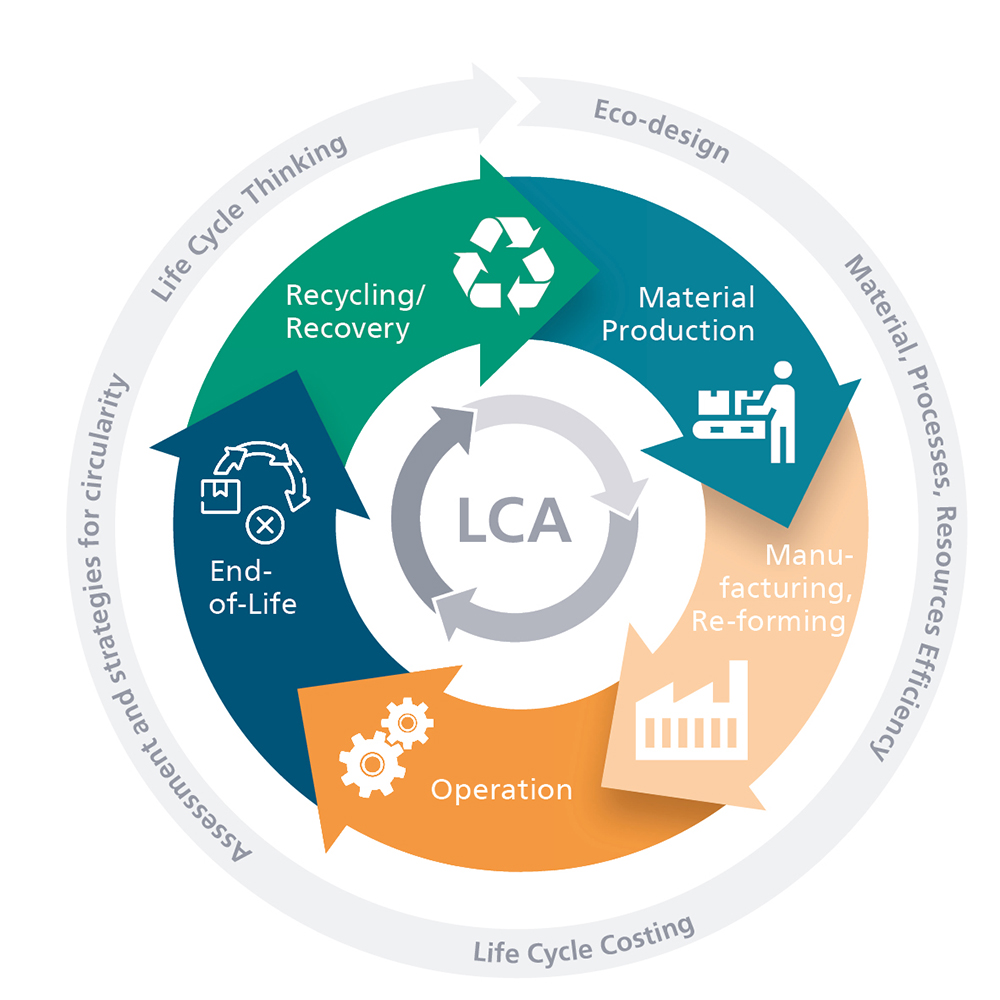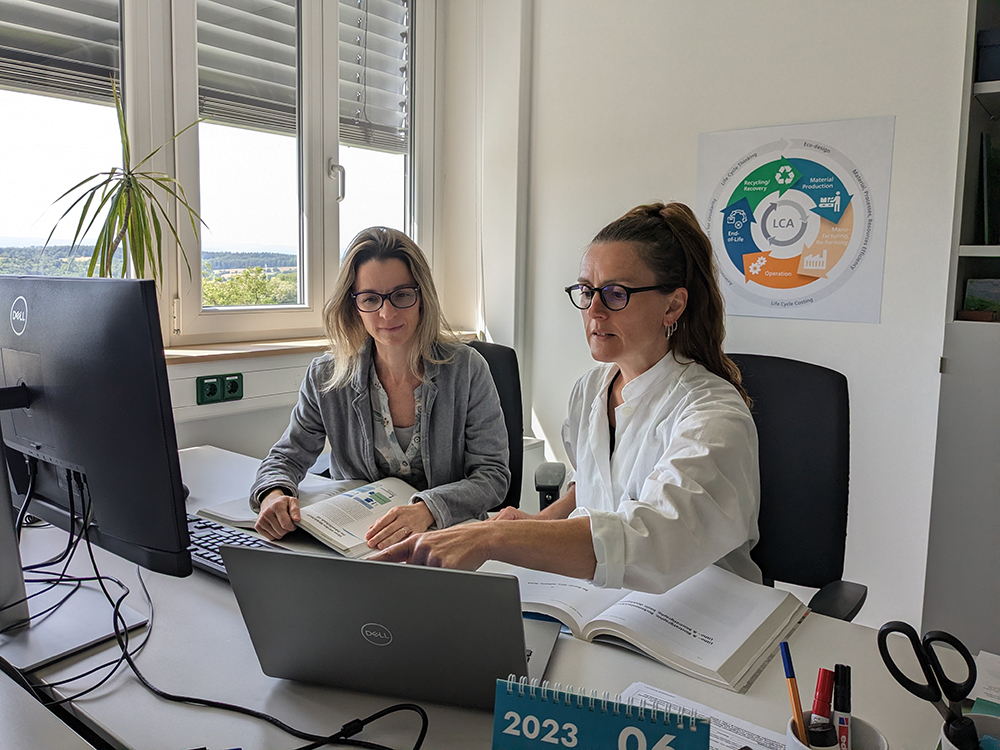The research group for sustainability and circularity assessment supports your developments with life cycle assessments (LCA), life cycle cost analyses (LCC) and the development of recycling concepts for products, processes and materials. Our goal is to identify potential improvements at each stage of the life cycle, to close information gaps and thus ensure a reliable assessment (e.g. from the recycling stage).
Sustainability and circularity assessment
Sustainability assessment
Life cycle assessment – LCA according to ISO 14040/14044:
- Comparative life cycle assessments: evaluation of the potential environmental impacts of a defined product system throughout its life cycle.
Examples: packaging materials, biomaterials, lightweight structures, chemical and mechanical recycling, energy requirements of processes. - LCA CO2 screening (as part of a life cycle assessment): simplified assessment of the potential greenhouse gas emissions of a defined product system along its life cycle, to estimate potential emission reductions and identify drivers and potentials for further improvements.
Life cycle costing - LCC
Evaluation of the costs associated with the life cycle of a defined product system from the perspective of a stakeholder within the value chain.
Eco-efficiency analysis
Combined evaluation of LCA and LCC results for a defined product system with the aim of identifying the most (eco-)efficient alternative.
Sustainability management
The expertise of the research group is incorporated into Fraunhofer ICT's sustainability management. The group is responsible for preparing the Fraunhofer ICT sustainability report, and contributes to sustainability measures within the institute. The Fraunhofer Climate Officer for Fraunhofer ICT is based in the group, and its researchers are active in the Fraunhofer Sustainability Network. (https://www.ict.fraunhofer.de/en/nachhaltigkeit.html)
Circularity assessment

Circularity concepts for better/more reliable/more accurate LCA results
Sustainable economics also means the responsible management of our planet’s limited resources. The market- and product-dependent development of material recycling concepts form a cornerstone of this work. These concepts rely on both physical recycling and the establishment of recycling processes, as well as reliable holistic assessments (LCA/LCC).
Life cycle gap analysis - LCGA
This is a method for the targeted evaluation of the LCA and/or LCC results of a defined product system with reference to circular economy aspects. The aim is to identify potential improvements without disregarding adverse interactions (so-called trade-offs) within the overall calculation.
Better assessment of the use phase through the application of environmental simulation data in the life cycle assessment
This involves an experimental measurement of the change in material properties due to environmental influences. On this basis, predictions can be formulated for the material behavior during the use phase and the expected service life.
Resource-efficient processes and management
The aim is resource conservation through an overarching and integrative view of the use of different resources, as well as a consideration of circular economics.
Our services
- Collection of primary data and creation of individualized data sets
- Life cycle assessment in the development phase to facilitate decision making
- Comparative life cycle assessments
- Product-specific CE and recycling concepts
- Eco-design and resource efficiency strategies
- Support in setting and evaluating potential environmental targets (hotspots for improvement, SDGs, corporate goals, etc.)
Life-cycle assessment training
Would you like to know
- ... how life-cycle assessments are carried out?
- ... what we mean by terms such as functional unit (fU) or product environmental footprint (PEF) method?
- ... how to evaluate your materials, products and processes according to Scope 3 and thus fulfill sustainability reporting obligations?
- ... how to define system boundaries, what to consider when collecting data, and how to interpret the calculated results?
We offer training tailored to your industry and application in accordance with the framework provided by the ISO 14040 series of standards, the EU Product Environmental Footprint (PEF) and the EU Corporate Sustainability Reporting Directive (CSRD). You will receive the necessary background information on the four phases of life-cycle assessment, evaluation methods, software and database solutions. We are happy to address your specific questions in connection with your products, materials and processes.
The training courses are aimed at anyone who wants to gain a basic understanding of LCA, including for example development engineers, product managers or plant managers.
Publicly funded projects (selection)
| Acronym | Title | Grant number | Further information |
|---|---|---|---|
| biocharPP | Entwicklung von CO2-optimierten Biomassekarbonisat-Compounds als kreislauffähige Werkstofflösung für Kunststoffkomponenten | Fraunhofer PREPARE | Link |
| CircBreath | Zirkularität von medizinischen Einmalgebrauchsprodukten – Machbarkeitsstudie am Beispiel eines Beatmungsbeutels | BWCE 24104 | Link |
| Clean Aviation - AMBER | innovAtive deMonstrator for hyBrid-Electric Regional application | 101102020 | Link |
| Clean Aviation - FASTER-H2 | Fuselage, Rear Fuselage and Empennage with Cabin and Cargo Architecture Solution validation and Technologies for H2 integration | 101101978 | Link |
| Clean Aviation - HERA | Hybrid-Electric Regional Architecture | 101102007 | Link |
| Clean Aviation - NEWBORN | NExt generation high poWer fuel cells for airBORNe applications | 101101967 | Link |
| Clean Aviation - SMR-ACAP | SMR aircraft architecture and technology integration project | 101101955 | Link |
| EPSycling | Etablierung einer Kreislaufwirtschaft zu Wärmedämmplatten aus geschäumtem Polystyrol (EPS) | ||
| GIANCE | Graphene Alliance for Sustainable Multifunctional Materials to Tackle Environmental Challenges | 101119286 | Projekt-Website GIANCE (giance-project.eu) |
| NOMAD | NOvel energy storage technologies usable at MilitAry Deployments In forward operating bases |
|
|
| ConfidentAM | Continuous Fiber-Reinforced Low-Density Thermoplastic Additive Manufacturing | Link | |
| LignoPlas | Consolidated bioprocessing of lignin waste to polyhydroxyalkanoate bioplastic | ||
| 2LIPP | 2nd Life to Power Plants | No. 101096672 | Link |
| Prisma | Processing of thermoplastic materials in the SMC process | BW1_2024/02 | Link |
| Fraunhofer CPM | Fraunhofer Cluster of Excellence Programmable Materials | Link | |
| GroKuBat | High volume plastic battery housing | 19l21049F | Link |
| Subi²Ma | Sustainable biobased and biohybrid materials | Link | |
| Ecodynamics SMC | Application of fiber composites for chassis parts in series production | 03LB3023G | Link |
| Lite2Duro | Lightweight construction through resource- and CO2-efficient injection molding of thermoset molding compounds | Link | |
| PLAST2bCLEANED | Recycling of flame retardant plastics from waste electrical and electronic equipment (WEEE) | 821087 | Link |
| revolBras | Collection and raw material recovery of PET packaging | 033R272 | Link |
| CuBER | Copper-based flow batteries for energy storage & renewables integration | 875605 | Link |
| Fraunhofer CCPE | Fraunhofer Cluster of Excellence Circular Plastics Economy | Link | |
| SeDiMi | Sensitive density separation of waste plastic mixtures | 033RK084A | Link |
| Melody | Membraneless low-cost high-density RFB | Link | |
| ReQ+ | Cross-sectional project within the funding scheme "resource-efficient urban districts" | 033W100B | Link |
| Clean Sky 2 - Programme | Link | ||
| Clean Sky 2 - Eco-Design Transversal Activity | Link | ||
| Clean Sky 2 - Airframe ITD - Eco-Design | Link |
Publications
- 2023 - DIN Circular Economy Normungsroadmap - Mitarbeit: Torsten Müller
- 2023 - Sprue Recycling Conserves Resources - Maertens, Robert; Dieterle, Michael; Herrmann, Tayla; Hirz, Jan; Klaas, Dietmar
- 2023 - Human toxicity assessment of WEEE recycling process - Tripathi Neeraj, Salles Ana, Reinhardt Sebastian, Fantke Peter (publica.fraunhofer.de)
- 2022 - Life cycle (gap) analysis for advanced material recycling of PLA cups - Dieterle, Michael; Ginter, Jannis
- 2022 - Life Cycle Gap Analysis for Product Circularity and Sustainability - a Case Study with Three Different Products - Dieterle, Michael; Viere, Tobias
- 2022 - Circularity of consumer electronics within Life Cycle Gap Analysis - Dieterle, Michael; Lätsch, Corinna; Brantsch, Peter; Nioac de Salles, Ana Claudia
- 2022 - Life cycle assessment (LCA) for flow batteries: A review of methodological decisions - Dieterle, Michael; Fischer, Peter; Pons, Marie-Noelle; Blume, Nick; Minke, Christine; Bischi, Aldo
- 2022 - Resource Management as Part of Sustainable Urban District Development - Koller, Michaela; Eckert, Karl; Ferber, Uwe; Gräbe, Gudrun; Verbücheln, Maic; Wendler, Katja
- 2022 - DIN SPEC 91468 Leitfaden für ressourceneffiziente Stadtquartiere - Mitarbeit: Gudrun Gräbe
- 2022 - Environmental Improvement Potential of Flexible Polyurethane Foam for Aviation Applications - A Case Example Analysis - Brantsch Peter, Salles Ana, Hanich-Spahn Ronny, Höhne Carl, Reichert Thomas (publica.fraunhofer.de)
- 2022 - Gate-to-gate study for collaborative robot-assisted composite parts manufacturing using a work effort unit approach - Nioac de Salles, Ana Claudia; Reichert, Thomas; Ruiz, Ana Maria; Cordero, Jorge
- 2022 - New Life Cycle Inventories of chemicals used in the production of airframe parts - Nioac de Salles, Ana Claudia; Lätsch, Corinna; Brantsch, Peter; Gromer, Gabriela; Pohsner, Ute
- 2021 - Bridging product life cycle gaps in LCA & LCC towards a circular economy - Dieterle, Michael; Viere, Tobias
- 2021 - Continuous ultrasonic welding of thermoplastic composites - LCI Modelling for the Eco-Statement - Salles Ana, Lätsch Corinna, Reichert Thomas, et al. (publica.fraunhofer.de)
- 2019 - Die Integration von Fragestellungen der Circular Economy in die Ökobilanzierung - Dieterle, Michael; Viere, Tobias (publica.fraunhofer.de)
- 2019 - End-of-Life Tire Destination from a Life Cycle Assessment Perspective - Gomes, Genecy; Salles, Ana; Visconte, Lea; Pacheco, Ellen - ISBN: 978-1-83880-693-4
- 2018 - Life cycle gaps: Interpreting LCA results with a circular economy mindset - Dieterle, Michael; Schäfer, Philipp; Viere, Tobias
- 2018 - Life Cycle Assessment – A Tool to Eco-Design Structural, Composite Parts - Reichert, Thomas; Nioac de Salles, Ana Claudia
- 2018 - Entwicklung eines Design for End of Life Tools für die Luftfahrtindustrie - Wimmer, Ann-Kathrin; Salles, Ana; Müller, Torsten; Elsner, Peter
- 2018 - Rare Earths and the Balance Problem: How to Deal with Changing Markets? - Binnemans, Koen; Jones, Peter Tom; Müller, Torsten; Yurramendi, Lourdes
- 2017 - Application of eco-efficiency analysis to assess three different recycling technologies for carbon fiber reinforced plastics (CFRPs) - Dieterle, Michael; Seiler, Elisa; Viere, Tobias
- 2016 - Ökoeffizienz-Analyse zur Bewertung unterschiedlicher CFK-Recyclingtechnologien - Dieterle, Michael (publica.fraunhofer.de)
- 2011 - Contributions of individual countries’ emissions to climate change and their uncertainty - Niklas Höhne, Helcio Blum, Jan Fuglestvedt, Ragnhild Bieltvedt Skeie, Atsushi Kurosawa, Guoquan Hu, Jason Lowe, Laila Gohar, Ben Matthews, Ana Claudia Nioac de Salles & Christian Ellermann
- 2010 - Comparative Analysis of the Carbon Footprint of Wood and Plastic Lumber Railway Sleepers in Brazil and Germany - Nioac de Salles, Ana Claudia; Legey, Luis; Pinguelli; Luis; Pacheco, Elen; Woidasky, Jörg - ISBN 13: 9781847355577
 Fraunhofer Institute for Chemical Technology ICT
Fraunhofer Institute for Chemical Technology ICT